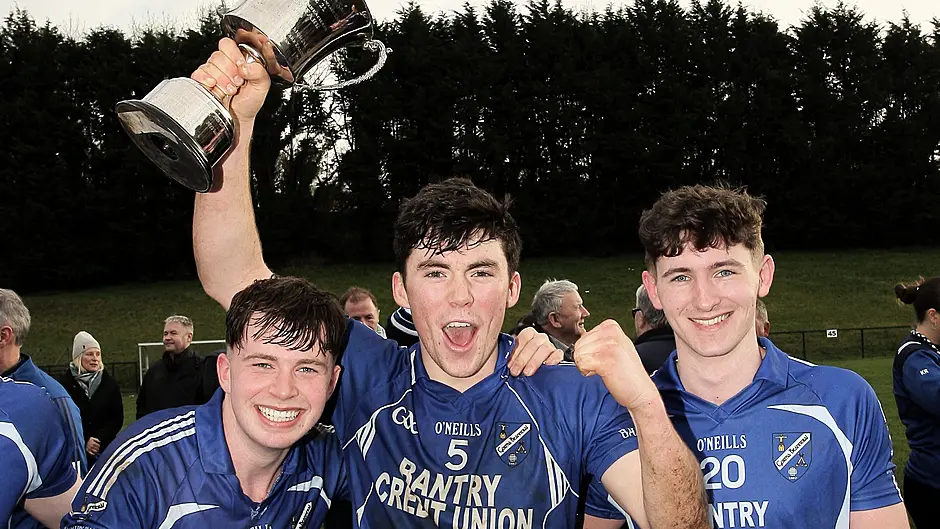TOM LYONS examines the predicament facing U21 championships and when to play them?
THE U21 championships were introduced at inter-county level in the mid-1960s and proved such a success that they were quickly introduced at club level.
It was recognised that the jump from minor to adult grades often proved too big for players and the U21 grade proved the real solution. The grade soon grew in popularity with both players and supporters and was eagerly looked forward to each season, providing some tremendous games.
A couple of years back, Croke Park decided to lower the minor age to U17 and the U21 grade to U20 for a variety of reasons. The idea has never really found favour at club level and is still the subject of experimentation. At the same time, the Cork county board decided to do away with their U21 championships in football and hurling which they claimed were causing too many problems as regards fitting them into the new master plan of fixtures.
Pressure was then put on divisional boards to follow the example of the county board but, thankfully, the divisions held their ground and refused to kill off the U21 championships, claiming, rightly, that they were too important in the development of young players between 18 and 21, were too popular with supporters and were also a good source of revenue for the boards.
The main problem then was that the county board did not fit any U21 championships into their fixtures’ plan and the divisional boards were left to their own devices in trying to squeeze the championships into an already squeezed programme.
The new split season merely added to the U21 confusion and the problems, as there is no space whatsoever for U21 during the ‘club’ months from August to October and clubs are not allowed to play their inter-county players during the ‘inter-county’ months, February to July. Eventually, last season, after much pressure from the clubs and divisions, the county board agreed to re-instate the county U21 championships but couldn’t find a space for them during the club season. The result was that they are now squeezed into the last two months of the year, November and December, when the weather is most unsuitable and pitches unplayable. Some of the finals were played off the week before Christmas.
As regards the divisional sections of the U21 championships, the county board agreed to make three weekends in February available to play off the football championships but no space has been provided for the U21 divisional hurling championships. Even the February agreement for football hit a snag when the Cork U20 selectors insisted on players training and playing challenge games with Cork during those three weekends, forcing young players, and parents, to make a choice between club or county, and causing confrontation between the clubs and the county executive at board meetings.
So, what we now have is a three-week slot in February, totally dependent on weather and availability of pitches, for the divisional football U21 championships, with the winners having to wait until November for the county section of those championships. No slot has been provided for divisional U21 hurling championships, with divisional boards endeavouring to squeeze them in somewhere. That resulted in 2024 with East Cork having to nominate a winner for the county premier championship in late November, a totally unacceptable situation.
For 2025, the divisional football championships will be played on the weekends of February 9th, 16th and 23rd, with the winners again waiting until November to play in the county championships. What happens if the weather turns bad during those weekends or pitches are unplayable is up in the air as the people who seem to matter most in all this, the county U20 selectors, will not release players outside those three weekends. Those championships must be a knock-out format because of the time restriction, which means that half the teams involved will play only one U21 football game in the entire season. How can that benefit clubs in developing these young players?
What can be done with the U21 hurling championships is anybody’s guess. When to play them is the million-dollar question, so as not to interfere with adult grades. Two years ago the Carbery board ran the hurling on Sunday mornings in November/December and it worked well because the weather obliged and there were no county championship deadlines to be met. The county U21 deadlines last season in November put paid to that format so the board tried to fit the games into July and the spare weekends in the adult championships in August but exam holidays and reluctance of clubs to release their players during the adult championships meant that attempt was something of a disaster.
Is there any solution to the U21 situation? The present split season makes it almost impossible to find one but a huge step forward would be made if it was agreed that county minor and U20 players must be released to play championship games with their clubs, except for a two- or three-week space before their county games. This would free up the month of March during which the county board U21 football championships could follow on directly from the divisional championships in February. As regards hurling, clubs must agree that July, or the weeks following the Leaving Cert, will be used for the divisional U21 hurling championship. The tight programme cannot accommodate the modern trend of Leaving Cert players heading off on holidays in July and clubs refusing to play without them.
There must be some give from the county board, the county selectors, the clubs and the players if an acceptable solution is to be found. The U21 grade, involving vital retention and development of players in the 17 to 21 age group, is too important to be shoved into some corner of the season, or not provided for at all. Many clubs, especially smaller rural clubs, are struggling for numbers at present and we will ignore this vital grade at a very serious cost indeed to the GAA in general.










